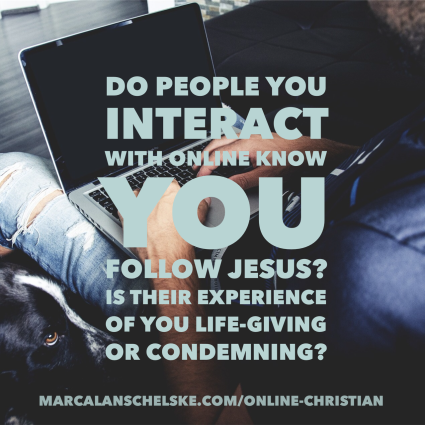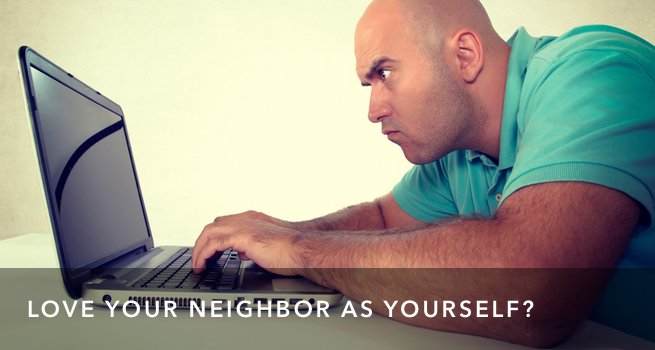8 min. to read.
In May of 2010, Facebook broke my church.
Honestly, it wasn’t Facebook’s fault. It had more to do with us—our level of relational wisdom and our lack of experience with digital communication—but Facebook was the vehicle. We drove the car into the ditch. You can’t blame the car.
Days before the debacle, Arizona had passed SB1070. You may remember this controversial bill requiring police to question people about their immigration status if the officer had any reason to suspect the person might be in the country illegally.
Of course, having skin of a certain color might be interpreted as reason to suspect, and that was the controversy. Was Arizona encoding racial profiling into law?
Immediately this became a national argument. Some Christian leaders spoke out against the law. One of those, Jim Wallace, wrote a post saying, “This law will make it illegal to love your neighbor in Arizona, and will force us to disobey Jesus and his gospel. We will not comply.”
Those are strong words, words that Christians across the country had to stop and contemplate. Certainly, they did in our community. A core member and leader posted Jim Wallace’s quote and a link to the article on Facebook.
The next five days were some of the most horrible I’ve ever experienced in ministry.
People chimed in supporting, thanking the original poster for their courage. After all, this is the sort of thing that needs discussion. Some people argued about the law and its intentions. People who were not lawyers started trying to interpret and challenge the language of the law. Others argued about whether this person should have posted anything about this to begin with. This person were accused of being divisive, violating their role as a leader. Of course, they had posted because they felt this was important for the church to take a stand on.
The thread’s temperature escalated like a forest fire. People who had worshiped side-by-side for years began attacking each other. With innuendo and outright accusation, people named each other judgemental, not very Christian, even racist. I knew we’d reached Three-Alarm-Fire status was someone made a reference to the Nazis.
Others in the community tried calming the blaze. They appealed to friendship, to our church relationships. They asked if we could talk about these things in person. They cautioned people to be careful with their words. It was a plant mister in the face of a conflagration. Others shot back. If we really were friends (accusation implied!), if we really were really Christians, we should be able to talk about these things!
By the time the conversation ended, twenty Bridge City people were involved in the thread, not to mention friends and gawkers. A number of relationships were significantly damaged. All this happened in a public place where hundreds of people got to watch the carnage unfold.
You have a couple of experiences like that, and you start thinking, “Maybe I don’t need digital communication in my life at all!”
But it’s not quite that simple for most of us. Facebook is just one form of digital communication, and digital communication is everywhere. There’s social media: Facebook, Twitter, Snapchat, Instagram, the next new thing. But even if you don’t use social media at all, we communicate by email and text all the time. Those handy tools are also digital communication with some of the very same crucial weaknesses.
At this point, digital communication is a nearly unavoidable part of modern life. These tools are just so dang convenient.
- Email helps me get work done much faster than I could otherwise.
- Text messaging allows me to stay in conversations well beyond what my time and presence allow.
- Facebook has allowed me, as an introvert, to have a wide circle of relationships.
- Twitter has empowered me to share my writing with the world.
These are amazing & powerful tools, but like any power tool, care is required! Power tools can help you get the job done quickly, with much less effort. But they don’t offer much nuance or margin for error. If you’re not careful with a power tool, you can make a big mess and do a lot of damage.
Careful now. We’ve never been here before!
Part of the problem is that we just really don’t have good standards and intuition about how to use these tools. Humanity has had countless generations to get accustomed to face-to-face communication. Over time, we’ve learned lessons that make for healthy and constructive relationships. Our parents and elders have passed those lessons on to us.
But pervasive digital communication is utterly new. It’s a significant element of our lives that our parents and grandparents simply didn’t have. Even though we consider ourselves experts, the truth is that we’re stumbling around in a new context, making messes as we go.

Just a few years earlier, that conversation at the heart of that devastating Facebook disaster would have probably happened over lunch after church. The only people in the conversation would have been the people in the actual room—people who were already in relationship.
They would have had the benefit of seeing each other’s faces and hearing each other’s tone of voice. They would have had the natural opportunity to ask clarifying questions. When they spoke, they would have been constrained by the implicit accountability most of us feel when we’re looking in the eyes of the person we’re about to judge or shame. There would have been no silent crowd of witnesses, or random strangers egging the conversation on.
But that’s not what happened. This conversation happened in the new town square — Facebook, and the consequences were not digital. The pain and loss happened in real life.
For you and I, as followers of Jesus, we must think through this part of our lives. How do digital communication and online relationships impact our faith? Our church communities? Our spiritual journey?
If these are an unavoidable part of life, how do we bring our faith into this new space? How does following Jesus change the way we speak and interact online?
Have you answered these questions?
Part of learning how to live in this new space is considering what it means to follow Jesus online?
- Does following Jesus online mean that you post scripture passages and Christian Memes?
- Does it mean you’re constantly evangelizing?
- Does it mean that you have to go around condemning everything you see in culture that you don’t agree with, or find immoral?
Short answer. No. In fact, these common “online Christian” behaviors are not very helpful at all.
In the next series of posts, we’re going to unpack this conversation. We’re going to look at some of the essential weaknesses of digital communication that we often ignore, and that can easily violate our calling as Jesus’ followers. Then we’ll talk about a model for bringing the ethic of following Jesus into the online space. But until then, consider these questions for yourself.
- Do the people you interact with digitally know you are a follower of Jesus?
- If they do, is their experience of you online life-giving or condemning?
- Is their experience of you marked by grace or law?
- Do they experience you in your online presence as hospitable and welcoming or self-protective and exclusionary?
- Might they see a gulf between the theological or moral positions you support and the things you say or do online?
- Are you a vociferous and vocal supporter of some cause, group or politician? If you are, does the nature of your support, and the message of your cause in any way distract from your primary role as an ambassador of Jesus Christ?
- When they observe your interactions with other followers of Jesus, do those interactions inspire them to think that Christian community is loving, supportive and growth-oriented, or do those interactions conjure up a different picture?
This is a whole new world, one that no group of humans has ever inhabited before. We are learning how to live in this space, and we’re mostly doing it by accident.
It’s high time that we gave some intentional thought to what it means for us to be part of Jesus’ tribe living in this new country.

I can’t wait for the rest of the conversation. Thanks for posting on this topic. Welcome back!
Thanks, Jon. Let me know what you think as you read the posts. Thanks for reading and commenting!
Thank you. I’ve learned not to engage (or respond quickly) in these hurtful conversations on Facebook. I use Facebook and Instagram as a tool to share the wonder of God’s creation with my many unsaved friends, occasionally throwing in a bible verse or Godly truth.
Thanks for reading and commenting, Mary! Glad you’re here.
This is such an important conversation to have. I teach systems change and we are in a powerful time of change. I think you say it here “the truth is that were stumbling around in a new context, making messes as we go.” Systems run with the underlying context and the context that showed up in your example is one that has been killing us in our society; that our normal is to judge, attack, and minimize each other. As you say, that’s not Christian. In my mind God is calling us forth into co-creating a new context. We can decide together to talk to each other differently, to have open honest conversations, to ask questions before jumping in to be critical. I have paid close attention to who I am on Facebook, I pay attention to who I engage with, and I am willing to call forth better actions from those that I am in-relationship with if they don’t ‘act well’ on Facebook. It’s not Facebook that is the problem, it’s our context of acceptable behavior, and that’s something we can do something about!
This right here: “It’s not Facebook that is the problem, it’s our context of acceptable behavior, and that’s something we can do something about!” is on the money. Exactly right. Let’s not surrender to the new medium and assume it has to be like this.
Thank you for these stimulating reflections – looking forward to the next posts!
Thanks, Catherine. Glad you’re here reading.
The most current issue I have had on facebook is with the word f—k. I told someone that it was not Ok to post stuff like that and she didn’t like it and defriended me. I felt bad about that but still there are things out there that we need to stand up too. If we continue to allow that kind of stuff pretty soon it becomes OK. I still feel bad because I respect this person but …….
You definitely have to decide what are the acceptable boundaries for you. As a pastor who works with all kinds of people from all kinds of backgrounds, I’ve long given up my concern for other people’s language. I have much bigger fish to fry and me worrying about their words gets in the way of much more important conversations that I’d like to have. But Facebook is also a public space, and your kids may see other people’s posts, so I can understand that kind of sensitivity.
Thank you for this courageous post. I just sent it to a couple of pastors at my church. I am so sorry you experienced the fallout from unfortunate online communication. May our LORD’s grace strengthen your heart over the coming days.
Thanks, Carol. Thanks for reading and for sharing. I really appreciate that.